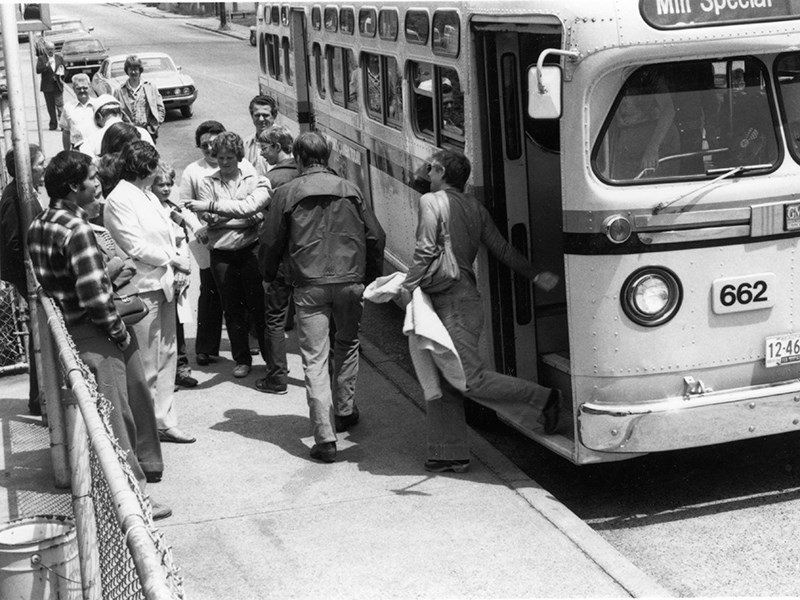Having safely and reliably transported several million passengers since its inception, the Powell River Transit System has passed a milestone.
It has been 50 years since the privately run Powell River Bus Lines Ltd. began supplying transit services within the then Corporation of the District of Powell River. Buses have been providing transportation to a broad cross section of the community, from school-aged children up to and including senior citizens.
A committee was established by the municipality in April 1966 to investigate public transportation in Powell River. Its mandate was to enquire into all aspects of public transit and receive submissions from anyone interested in public transportation.
In December 1967, residents were asked to vote on the fate of the local transit system. There were two ballots: to determine if taxpayers wished to have a transit system, and, if so, to decide whether to continue a subsidized system or set up a municipal system.
In June 1968, council concluded it was more practical to own and operate the bus system than to subsidize a private system.
In August 1968, council purchased controlling shares of Powell River Bus Lines, soon to become Powell River Municipal Bus Line.
A new bus schedule was announced on September 1, 1968. The terminus at the time was at Walnut Street in the Townsite. Eight routes were in place with service from Monday to Saturday, but no Sunday service. Routes included travel from Walnut Street through Westview to Grief Point, Wildwood and Cranberry to the Westview Depot.
In April 1979, the municipality collaborated with the provincial Urban Transit Authority (UTA), now known as BC Transit, to operate the bus service.
The agreement resulted in changes to the bus fleet. In 1971, the city bought two brand new single-door, 35-foot GM buses. When city transit supervisor Gerry Woods started in 1982, the municipality still had the two 35-foot GMs and they were still like new. UTA also leased three 1958 GM 35-foot buses with double doors to the city, and there was one 1976 GM double-door bus. In 1984, the single-door buses had to come off the road because two-door buses were preferable for municipal transit.
In 1980 the transit system underwent a major revamping, with revised routes to provide regular links between Westview, Cranberry, Townsite and Wildwood, and hourly service to Powell River Recreation Complex.
In 1998, Powell River received its first two 40-foot, wheelchair accessible transit buses. The municipality received its third and fourth low-floor bus in 2001/2002 and the complete system was then wheelchair accessible.
Bike racks were added to the buses in 2002. Council was onboard with the purchase, but Woods suggested waiting until people expressed a desire to have them.
“Before long, people said they saw bike racks on buses in other towns: ‘Are we ever going to get them?’” he said. “I put in a request to council, they freed up $5,000 and we got four bike racks right away.”
Tla’amin Nation became a funding partner of the system in 2002. There was a big ceremony in Tla’amin to celebrate the opening of the route. The bus currently runs there five times a day from Monday to Friday, and on Saturdays once in the evening. There are no runs on Sunday.
The transit system has been responsive to the requirements of the community. Buses now go to the airport, hospital, recreation complex and Brooks Secondary School.
Since the city acquired four low-floor buses, it has offered free training for anyone with mobility aids, especially wheelchairs, where people need to practice a little bit to get on the bus.
“We like to help people learn how to get on the bus so when it comes time to come on a bus that’s in service, they come on like a pro, helping them get on safely and efficiently,” said Woods. “It helps people to find their independence.”
Woods said he once parked a bus on Hemlock Street near Brooks with a “not in service” sign in the window and when school got out, 35 students got on the bus not even knowing where it was going.
“Right away we put a plan in place where we could divert buses over to the school and ridership just flew through the roof,” added Woods.
The city does the ever-popular Christmas light tour around Powell River every year. Four buses sell out and there is typically a two-busload waiting list.
During Blackberry Festival, buses leave from Town Centre Mall and transport riders to Marine Avenue. This year, 844 people were moved, sparing significant traffic congestion at the festival site.
Woods said for Powell River to have five modern buses, it is a milestone all on its own. They each have a wheelchair capacity of two and have just been retrofit, so they will probably be in service for another 15 years.
The Powell River transit system is the last one in the province run by a city. In other centres, big companies run the systems. Cities still pay for the contracted bus services, but in Powell River, drivers, mechanics and administrators are all city employees. The city runs it well enough that BC Transit has no plans to privatize the system.
Woods said that, as a result, a lot of care goes into running the system here, and making it responsive to the requirements of the community.



